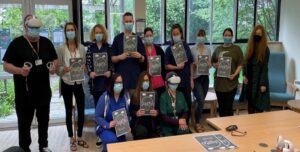The proverb, ‘If the mountain won’t come to Muhammad, then Muhammad must go to the mountain’ speaks of seeking an alternative if the wished-for reality is not possible. But what if Muhammad is too ill to go to the mountain? In today’s fast-moving era of extending reality through technology, can a virtual mountain, or other experience, delivered through a headset to a home or hospital bed come close to the real thing? Or might it add salt to the wound, and risk intensifying a sense of loss?
A wish to find solutions for people I had met who were living with conditions meaning that they could not physically reach wellbeing opportunities inspired me to begin creating and delivering virtual and immersive experiences in 2020. Since then, I have been working with Hywel Dda UHB, Pembrokeshire County Council and other partners to develop two projects which explore the health and wellbeing benefits of Virtual Reality. Connecting Realities focuses on creating and delivering experiences for people at risk of isolation who might struggle to reach physical wellbeing opportunities. A large proportion of these participants are living with mid to late-stage Dementia. VR Inclusive Mental Health Interventions is a collaboration with the Pembrokeshire Older Adult Community Mental Health Team. It aims to improve outcomes for patients presenting with low mood who may have a history of suicidal thoughts or attempts. Regular tailored VR sessions have been established for these patients.
Between the two initiatives, which have both been awarded Bevan Exemplar status, we have run over 200 sessions. The stories emerging from this work, sometimes surprising and often poignant, suggest that the virtual can in many cases offer a meaningful alternative when the physical is not possible.

Virtual Visits: Modern culture has firmly embraced concepts like the ‘bucket list’ and ‘FOMO’ (fear of missing out), and VR technology is increasingly harnessed to enable individuals to explore virtually places they would otherwise never see. Experiences like The Lion King on Broadway or deep-sea swimming alongside manta rays in Mexico have been popular, particularly for improving mood and alleviating distress. While these extraordinary virtual experiences offer a refreshing escape, we have also found virtual visits to places and events that are local to the participants and might at one time have been part of their every-day lives can provide grounding familiarity. One care home resident asked her daughter for the bus fare for that day’s journey to nearby Tenby, though it had been virtual. “And we’re going again next week,” she said happily. On another occasion a short film of a rehearsal of a local choir requested by one patient inspired another who had not responded to other interventions to sing.
A Power-shift: We have observed VR having benefits beyond the obvious and anticipated. One particularly telling instance involved a participant living with dementia who, faced with the terrifying loss of control over his life, manifested an intense need to dominate his surroundings. He had convinced himself he managed the care home where he resided and grew increasingly unsettled when staff didn’t comply with his orders. His demeanour however was transformed after just a few moments with a VR nature experience. He identified the filmed place and his narrative changed to one of joy, as he described the wonder of witnessing nature’s uncontrollable forces. “It makes you gasp,” he said.
A Sense of Home: Similarly, VR facilitated a short-term mood transformation for a care home resident experiencing relentless agitation because of her wish to return home. She watched only a few seconds of a sea-side experience, commenting that she had seen enough sea to last a lifetime when she was on the QE2. This exchange steered the conversation toward her travels and the discovery that these, unlike discussions about her lost home and late husband which visibly pained her, were able to provide relief and perhaps the closest thing to a feeling of comfort and home that it was possible for her to find at that time.
Individual Benefits: The advantages of VR sessions can be as individual as the needs of the participants themselves. Virtual experiences have acted as a bridge to strengthen relationships as evidenced by one attendee who bonded with her neighbour by regularly sharing her VR experiences and felt more confident for having something exciting to talk about. One gentleman in day-care, when asked how an experience made him feel, simply stated it made him feel ‘important.’ We have witnessed improvements in participants’ posture and communication skills following sessions, and care home and clinical partners have found that the conversations that happen as a result of the experiences can help them better know and understand the people they are caring for.
Back to the Mountain: Although nothing can truly replace the sensation of breathing in crisp clean air and feeling, as John Muir described, Nature’s peace flowing into you as sunshine flows into trees, we can explore the freedom and new opportunity of creating within a virtual realm. Inspired by cinematic methods, we can produce filmed experiences that stir emotions and reveal truths. By harnessing the power of the development platforms traditionally used for animation and game-making we can play with physics and create spiritual experiences that would be akin to magic in the real world. Through Innovate UK Creative Catalyst funding we are currently involving artists, poets, musicians and other creatives in the development of new experiences that are designed to have a positive impact on the wellbeing of the patient and community groups we have been working with. We hope the results will resonate with the needs of palliative care patients and find ways to reflect and connect with the metaphorical journeys people face at the end of life. As Kahlil Gibran said in his poem, ‘On Death’, ‘when you have reached the mountain top, then you shall begin to climb.’
Author

Sarah Beauclerk, Director at Vere Experiences CIC
Email: connectingrealities@gmail.com
Twitter: @VrConnections
Declaration of interests
I have read and understood the BMJ Group policy on declaration of interests and declare the following interests: none.